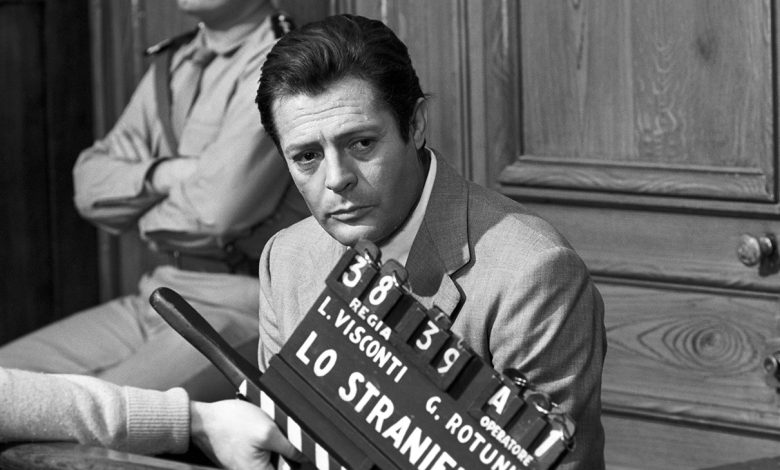Marcello Mastroianni Beyond Latin Lover

“Marcello Mastroianni was known, all around the world, as the Latin lover, the Italian seducer, especially after he starred in La Dolce Vita, Federico Fellini’s masterpiece,” says Fabrizio Corallo, the director of the new documentary Ciao Marcello, Mastroianni l’antidivo. “Mastroianni did not like this image. He didn’t want to be seen as an icon, as a sex symbol. He didn’t care much about his public persona; what did matter to him was his personal life. So, I tried to build an intimate portrait of this unique actor.”
Corallo is a journalist and an expert on the history of Italian cinema. For state broadcaster Rai he has made a number of documentaries about the great personalities of Italian cinema: Dino Risi, Vittorio Gassman, Virna Lisi, Ennio Flaiano and Giuliano Montaldo, among others.
Ciao Marcello, which was co-written with Silvia Scola, the daughter of Italian filmmaker Ettore Scola, who directed Mastroianni in 1977’s A Special Day, had its premiere at the Rome Film Fest and will air on Rai TV on Sunday, Oct. 27 (it’s available on MUBI in the U.S.). The film arrives 100 years after the actor’s birth — he was born on Sept. 28, 1924 and died on Dec. 19, 1996.
Produced by Massimo Vigliar and Adriano De Micheli for Surf Film, Dean Film and Cinecittà Spa, the film offers a deep insight into the life and art of Mastroianni, with the help of many audio and video interviews with many of the actors, screenwriters and film directors who worked with him. But we can also find in this film a touching interview with the mother of the actor, Ida Rolle. “We discover a famous actor who, at the peak of his career, values above all other things his mother’s meatballs,” recounts Corallo.
“This documentary is especially meant for young audiences, for people who’ve never heard of him,” the director continues. “Mastroianni was born 100 years ago, in 1924, and he died in 1996, at age 72. He appeared in 150 movies, garnered many international honors, including a Golden Globe, two best actor awards at the Venice and Cannes festivals and three Academy Award nominations. He became an international star through his collaborations with Federico Fellini, of whom he became a sort of alter ego. He formed a wonderful onscreen duo with actress Sophia Loren, co-starring with her in eight films. Nonetheless, his name could soon vanish among the younger generations. That is why this movie exists.”
“What do I love mostly about him? His simple way of living and acting: his way of being honest and modest. His way of offering himself to the viewer. His delicate way of acting, which is a very rare quality. And his disillusioned approach to everything, without being cynical,” Corallo adds.
As for the title of his documentary, Ciao Marcello – Mastroianni l’antidivo — which in English means Goodbye Marcello, Mastroianni the Anti-Diva — Corallo says it refers to an image Mastroianni had in the media that irked the actor. “He hated the ‘latin lover’ label which he got from the press,” says Corallo. “He didn’t like at all being a movie star. He was rather shy, and he loved real life far more than the shining surface of the movie world.”
Corallo says he intentionally didn’t try to dig too deeply into the gossipy aspects of Mastroianni’s personal life. “He had a tormented love life, including important love stories with actresses Faye Dunaway and Catherine Deneuve, but we tried to tell these stories with a light touch”, says the journalist. “We let him talk about himself, and we let people who worked with him talk about Mastroianni.”
Among the discoveries Corallo made were interviews that Mastroianni gave in other languages, which often allowed the actor to show a more relaxed and playful side of himself. “He was more freewheeling when interviewed in other languages. For instance, we discovered a long interview with Spanish TV, and another one in English, on The Dick Cavett Show in 1977. He and Sophia Loren were interviewed for an hour. They were on the same wavelength, they were ironic, funny, relaxed, sincere. We took only a minute from that interview, but it was a gold mine.”
To connect the interviews and the archive footage, Corallo used a series of short dramatic re-enactment scenes with the Italian actors Luca Argentero and Barbara Venturato. “We created these little fiction inserts, in which we imagine that a young assistant editor, Barbara Venturato, is working on a documentary about Mastroianni, without knowing anything about him. So, Luca Argentero — who is a very well known face for the Italian audiences — explains to his young friend the real greatness of this giant of our cinema.”
Adds the director: “We have tried to create an intimate portrait of Mastroianni. I hope we have been successful.”
Source: Hollywoodreporter
Related Posts
- Roundball Rocked: With NBA Return Looming, NBC Purges Scripted Roster
- SoundCloud Says It “Has Never Used Artist Content to Train AI Models” After Backlash on Terms of Service Change
- Fox News’ Camryn Kinsey Is “Doing Well” After Fainting on Live TV
- Kerry Washington and Jahleel Kamera in 'Shadow Force.'
Courtesy of Lionsgate
…
- This Alternative Artist Landed a Top-20 Chart Debut With an Album Made Almost Entirely on His Phone





